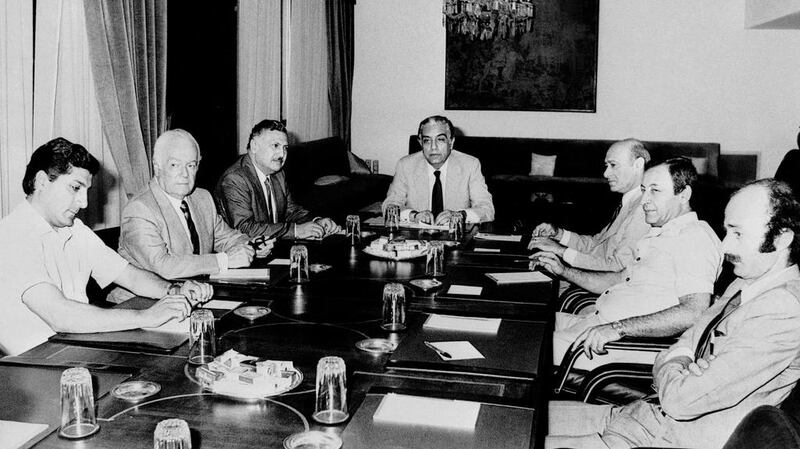The death of Fouad Boutros at the age of 98 last weekend made many Lebanese reflect on their present. Mr Boutros served on several occasions as a minister, the last time during the civil war, and contrasted favourably in the public imagination with the depravity of the political class today, a rare vestige of a regretted bygone era.
This view was tinged with some nostalgic delusion. After all, when Mr Boutros last served, as foreign minister under president Elias Sarkis (1976-1982), Syria had already imposed its debilitating dominance over Lebanon. Though the government of which he was then a part tried to conduct Lebanese affairs in a sovereign fashion, this became increasingly difficult due to Syria and the warring militias.
Still, Mr Boutros was at the vanguard of Mr Sarkis’s endeavours, since foreign policy was still regarded as a bastion of Lebanese self-affirmation during the war years. He followed in the tradition of other prominent foreign ministers, from Selim Takla to Charles Malek to Khalid Abouhamad, a man of substance who could just as skilfully speak to the Arab world as to the West.
Mr Boutros was a great sceptic, the natural reflex of a man manoeuvring in an unstable country and region. He was also a political animal, interested not only in high politics but also the electoral scene in Ashrafieh, the Beirut district from which he originated, where he could shape how prominent Greek Orthodox families, an important voting bloc, would lean in elections.
I met him only once, yet got a taste of this side of his character. At the time, more than a decade ago, I was working on a paper examining Lebanese-Syrian relations and interviewing Mr Boutros was unavoidable. Though frail, he received me at his home and generously gave me time to ask all my questions.
The interview came soon after Mr Boutros had played a mediating role between Maronite patriarch Nasrallah Sfeir and Bashar Al Assad. The Maronite church had asked the Syrian president to pull his forces out of Lebanon, but the mediation was destined to fail because Mr Al Assad rejected any notion of withdrawal. It was revealing that Mr Boutros’s only request of me was not to publish anything that might undermine his chances of resuming such mediation “if called upon to do so”.
Though he was then well over 80, Mr Boutros was still keen to play a political role. His quaint formulation was spoken like a true public servant, which he had effectively been since the days of president Fouad Chehab. Mr Boutros, a lawyer, was one of the young men whom Mr Chehab promoted to implement his seminal statist policies during the 1950s and 1960s, notably serving as the key planning minister in 1959-1960 in Rashid Karami’s government.
Nor was it a coincidence that Patriarch Sfeir would ask this quintessential representative of the state to act on his behalf with Mr Al Assad. As a Greek Orthodox former mandarin, Mr Boutros was less likely to exploit his mediation for personal political gain; and he embodied the independence to which the patriarch hoped Lebanon would return once Syria evacuated its forces.
But it was as foreign minister that Mr Boutros is best remembered. Those were still the days, before the complete Syrian takeover in 1990, when parts of the government sought to defend what was left of the state that had collapsed in 1975. Mr Sarkis, a prominent Chehabist like Mr Boutros, is recalled as Lebanon’s last president with both ethics and national vision.
It is the president’s personal integrity, like that of Mr Boutros, that the Lebanese long for these days. Both men were always above the lowly corruptions that have come to permeate Lebanese politics.
However, beyond the symbolism there was also achievement. Most significantly there was Lebanon’s successful push for Resolution 425, passed by the Security Council in 1978 and calling for an Israeli withdrawal following its invasion of the country’s south.
The person most responsible for this was perhaps Ghassan Tueni, Lebanon’s ambassador to the United Nations, but the ability to secure a consensus around the resolution was a collective effort of the government. The relationship between Mr Tueni and Mr Boutros, both Greek Orthodox from Beirut, both brilliant and ambitious, was not always idyllic. However, they worked towards a common purpose and never let their differences hinder this.
Mr Boutros was called back in 2005, when he was given the task of heading a committee to reform the parliamentary election law. What emerged was a hybrid proposal. While it offered many valuable new ideas, it was complicated enough to be shelved by the political class that could be expected to lose most from it.
It was an emblematic moment. Mr Boutros had helped devise a project, one of whose aims was to weaken the stranglehold of the sectarian leaders over their electorates. All in the interest of the state he had served. The project’s defeat was very much that of Mr Boutros and what he exemplified. It was also a confirmation of Lebanon’s inexorable drift away from the Chehabist ideal.
Michael Young is opinion editor of The Daily Star in Beirut
On Twitter: @BeirutCalling





